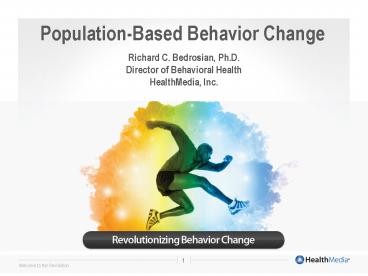PopulationBased Behavior Change - PowerPoint PPT Presentation
1 / 31
Title:
PopulationBased Behavior Change
Description:
What behaviors need changing among your covered lives? ... Combined with medication, DM, coaching, EAP, psychotherapy. 8. Welcome to the Revolution ... – PowerPoint PPT presentation
Number of Views:26
Avg rating:3.0/5.0
Title: PopulationBased Behavior Change
1
Population-Based Behavior Change
Richard C. Bedrosian, Ph.D. Director of
Behavioral Health HealthMedia, Inc.
2
Consider These Questions
- What behaviors need changing among your covered
lives? - How are you promoting patient self-management in
your population? - What is the reach of your interventions?
- How much are the lives you cannot reach costing
you? - Are you able to show ROI to health plans?
Employers? - What population-management interventions can you
deploy right now to increase reach and improve
outcomes?
3
Traditional Disease Management
4
Evolution of Chronic Care Scope
- Intensive Case Management Subset of DM
population with severe disease and high cost
(CHF) - Disease Management Subpopulation with specific
chronic conditions and/or risk factors - Population Management Intervention across the
total population of eligible members
5
The Future of Disease Management
6
A Revolution Driven by the Internet
Combining population management and patient
self-management
- Why the Internet?
- Reflects changing consumer attitudes and behavior
- Highly scalable and cost-effective
- Dissemination to relatively healthy or
sub-threshold individuals - Available 24/7 during high need
- Consistent delivery
- Confidentiality
- More self-disclosure to computer assessment
- Risk stratification and intelligent recruitment
- Tailored messaging to individuals concerns,
motivations, and readiness to change - Follow-up/longitudinal component built in
7
A Revolution Driven by the Internet
Combining population management and patient
self-management
- Deployment Models
- Offered by health plans or employers
- Web-based HRA provides mass screening
- Assessment data leads to tailored messaging
- Intelligent recruitment drives participation in
online interventions - Used as standalone treatment for those
- Unwilling to get treatment
- Disabled/geographically isolated
- At subthreshold levels of severity
- Integrated into the spectrum of care
- Combined with medication, DM, coaching, EAP,
psychotherapy
8
If I said Web interventions change behavior .
- What questions would you ask?
PARTICIPATION
EFFICACY
OUTCOMES
Will anyone use it?
Can it show measurable improvement?
Does it work?
For which
behaviors?
SCALABILITY
COST
ROI
Can we justify the investment?
Can we afford it?
Can we deliver it to our
entire population?
9
Web Content Web Interventions
10
(No Transcript)
11
(No Transcript)
12
Tailoring Images Drives Better Outcomes
- Tailoring visual inputs results in greater
attention to the material presented and drives
superior outcomes.
The tailored image resulted in the most
picture/text saccades and a smaller average pupil
size demonstrating greater concentration on the
tailored message and resulting in superior user
testimonials
2X
13
(No Transcript)
14
(No Transcript)
15
Will Anyone Use Web Interventions?
- Participation and recruitment case study. Driving
widespread participation and creating a culture
of health.
16
Will Anyone Use Web Interventions?
- Participation and recruitment case study. Driving
widespread participation and creating a culture
of health.
17
Are the Interventions Scalable?
- Number of HealthMedia Interventions Delivered
18
Measurement Depression Prevalence
Data from Succeed
30.4 - Experiencing depression or in treatment
19
Depression Comorbidity and Productivity
WPAI Data from Succeed
This differential costs up to 20,000 per
employee/year
Productivity Impairment
20
(No Transcript)
21
6 month outcomes
41 decrease in average CES-D scores from 5.29
to 3.10 16 increase in the confidence to
manage depression High program satisfaction
(87.7 rated program as excellent / very good /
good)
22
Outcomes Total Cholesterol Changes
HMSA Health Pass Participants 2002-2005
23
Outcomes Systolic Blood Pressure
HMSA Health Pass Participants 2002-2005
24
(No Transcript)
25
6 month outcomes
29 decrease in physician visits in past 3
months 28 decrease in those visiting a
physician twice or more in past 3 months 38
decrease in productivity impairment
Productivity savings of 5,375 per year per
participant
26
ROI Cost Analysis for CFYH Participants vs.
Non-Participants
937
Total healthcare costs include inpatient,
outpatient, professional and pharmacy costs. All
dollars amount were adjusted to 2008 values.
Trajectory estimate for participants and non
participants used 2nd-order polynomial regression
of 2003-2006 cost data for best fit, R2gt.98,
plt.006. For participants, one sample t test
indicated that the actual value in 2007 was
significantly lower than the predicted value,
t(412)2.66, p.008. For non-participants, there
was no significant difference between the actual
value and the predicted value, t(359)0.36,
p.719.
27
How much did it cost?
- 20 PMPM? 15? More?!
28
How about 1/4 of a penny PMPM?
- A truly game changing solution
29
Consider These Questions
- What behaviors need changing among your covered
lives? - How are you promoting patient self-management in
your population? - What is the reach of your interventions?
- How much are the lives you cannot reach costing
you? - Are you able to show ROI to health plans?
Employers? - What population-management interventions can you
deploy right now to increase reach and improve
outcomes?
30
Contact Information
- Richard Bedrosian, Ph.D.
- Director of Behavioral Health
- HealthMedia, Inc
- 508-393-5638
- rbedrosian_at_healthmedia.com
- To learn more about our population-based
solutions - Call 734.623.0000 x300
- Or email info_at_healthmedia.com
31
How about 1/4 of a penny PMPM?
- A truly game changing solution































